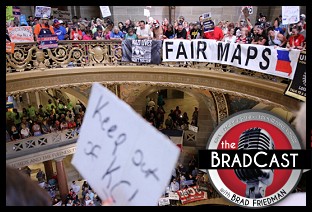READER COMMENTS ON
"Should Judge Martin Feldman be Impeached?"
(39 Responses so far...)
COMMENT #1 [Permalink]
...
URSheep
said on 6/24/2010 @ 2:48 pm PT...
He owned those stocks in 2008. He didn't own them when he was assigned the case. EPIC FAIL.
COMMENT #2 [Permalink]
...
Brad Friedman
said on 6/24/2010 @ 3:01 pm PT...
URSheep @ 1:
Weird that Feldman himself would admit owning Ocean Energy (which he says is owned by Transocean) stock in May 14, 2010 court docs [PDF], eh?
Epic fail? Who R sheep??
COMMENT #3 [Permalink]
...
Tom
said on 6/24/2010 @ 4:14 pm PT...
While other drilling platforms may not fail, (or they may), the fact remains that if they do fail, there are no satisfactory methods for quickly shutting off the flow, and preventing another ongoing disaster. The Judge is owned by oil interests.
COMMENT #4 [Permalink]
...
Menlo Bob
said on 6/24/2010 @ 4:20 pm PT...
Who knew stocks he no longer holds can be held up as a conflict of interest...oh, that's right, this blog and most media outlets. Thanks guys for the mis-information.
COMMENT #5 [Permalink]
...
Neal
said on 6/24/2010 @ 4:55 pm PT...
How come the article doesnt mention that there have been over 50,000 wells drilled in the gulf, including over 700 ultra-deep water wells, with only one major spill. That's a success rate of around 99.9998%. The evidence is overwhelming that the BP accident is not indicative of the industry. Any reasonable person would come to the same ruling as Feldman!
COMMENT #6 [Permalink]
...
Syl Altukhaim
said on 6/24/2010 @ 5:09 pm PT...
Judge Feldman seems to be saying that there is no proof of harm in oil drilling. We need a stronger EPA and the President should cancel all the deepwater oil leases that were sold by Bush. The environmental impact statements were inadequate and the oceans resources should be owned by the the United States, not foreign corporations.
COMMENT #7 [Permalink]
...
Ernest A. Canning
said on 6/24/2010 @ 5:55 pm PT...
Wow! Real impressive reasoning Neal @5. I mean if there are 700 deep water wells and only one has produced an explosion, deaths and environmental devastation throughout the region, then the sheer math reveals how "safe" deep water drilling is, right?
Consider application of your logic to nuclear bombs and warheads. In 1966 their number in the U.S. was 32,193.
So if one of those babies went off and leveled New York City, under your logic the government would have no right to prevent a nuclear warhead manufacturer from storing their bombs in a vacant lot next to your house. After all the nuclear accident rate would, in that case, be only .003% so why worry about safety?
In fact, since none of those bombs actually went off that means there's no danger. So I'm sure you won't object if the government decides to store one in your basement!
URSheep and Menlo Bob, interesting that neither of you furnished a link to back up your remarkable, and thoroughly erroneous claim, that Judge Feldman sold off all of his financial interest in the oil industry in 2008.
Menlo Bob should be especially embarrassed since his erroneous claim was made an hour and 19 minutes after Brad Friedman posted a link to a May 14, 2010 official court document which revealed Judge Feldman owns stock in Ocean Energy, which is a subsidiary of Transocean, the owner of the very deep water drilling platform that exploded.
Did it ever occur to you two that it may be your sources and not "this blog and most media outlets," which is the source of "misinformation?"
COMMENT #8 [Permalink]
...
libhomo
said on 6/24/2010 @ 5:56 pm PT...
At the very least, he should be facing impeachment.
COMMENT #9 [Permalink]
...
none ofyour biz
said on 6/24/2010 @ 6:34 pm PT...
impeach the idiot..... may his family drown in the same oil that the rest of our food is drowning in... drill baby drill.... maybe he is just getting republican kickbacks! Shocking... politically powerful republicans soaking up the $$$ with no regard for anyone but themselves. And thats coming from someone who traded stocks for 15 years!!!
dumbasses
COMMENT #10 [Permalink]
...
Mike
said on 6/24/2010 @ 6:38 pm PT...
How did you get that filing? The court's website only shows documents through pacer. Is there another way to access the case?
COMMENT #11 [Permalink]
...
davboz
said on 6/24/2010 @ 7:08 pm PT...
NO, He should absolutely NOT be impeached. Where would such an outlandish idea come from? It sounds very childish. A typical response from one who didn't get their way. Oh, and, What oil holdings? This unchecked repeating of things heard has really got to stop. And the comments here are embarrassing. To think these are the people I grew up around in this country for so many years. Disgusting!
COMMENT #12 [Permalink]
...
1st Republic 14th Star
said on 6/24/2010 @ 8:05 pm PT...
"high crimes and misdemeanors" is an Old English expression. It has a very specific meaning which was perfectly well known to the writers of the Constitution. It doesn't refer only to the types of crimes that can be prosecuted and result in jail time. It means abuse or misuse of office. That's something there may be an argument for in this instance.
COMMENT #13 [Permalink]
...
camusrebel
said on 6/24/2010 @ 8:11 pm PT...
as soon as I heard some judge ruled against the moratorium, I knew he was solidly in big oils pocket, as did all clear thinkers.
After the worst environmental destruction ever, a gusher that KEEPS ON GUSHING EVERY SINGLE FUCKING SECOND OF EVERY SINGLE FUCKING DAY FOR WHO KNOWS HOW LONG......we can't even get a temporary halt to new wells, let us catch our collective breath, maybe, just maybe figure out a way to plug a similar leak if it were to happen again.
Drill baby etc, right Kneel and Bob? Keep right on kneeling and bobbing, oil barons got plenty of lube for your ilk.
COMMENT #14 [Permalink]
...
Cosimo diRondo
said on 6/24/2010 @ 8:13 pm PT...
It's the government's responsibility to prove there's a problem, but we don't the federal government regulating and otherwise intruding upon private business.
On the bright side, Marty Feldman was funny as hell in Young Frankenstein. "No, it's pronounced EYE-gor."
COMMENT #15 [Permalink]
...
Ernest A. Canning
said on 6/24/2010 @ 8:13 pm PT...
The only one engaged in the "unchecked repeating of things heard," DAVBOZ @11, is you!
Since you appear incapable of linking to the May 14, 2010 Minute Order [PDF], signed by Judge Feldman, even though the link was previously furnished by Brad Friedman @2, I'll provide the pertinent language for you and any other factually challenged individuals so that they can avoid further embarrassment by posting such uninformed nonsense:
"The Court owns stock in Ocean Energy, Inc. which is owned by Transocean, Inc."
At its website, Transocean boasts that it is "the world’s largest offshore drilling contractor."
Now that you have the real facts, DAVBOZ, would you like to retract your claim that impeaching Judge Feldman is either an "outlandish idea" or that it is simply a "response from one who didn't get their way?"
COMMENT #16 [Permalink]
...
Ernest A. Canning
said on 6/24/2010 @ 8:33 pm PT...
With all due respect, Cosimo DiRondo @14 you've got it backwards. The burden is always on a developer to prove a project is safe.
Consider, for example, CA land use laws. When a developer comes before a city planning commission or a city council with a proposal to build a major construction projection, one of the first items required is an environmental impact report. Such reports are required because one of the most basic functions of government is to protect the public health and safety.
"Prove there's a problem?" Track back through the multiple Green News Reports provided by Brad Friedman and Desi Doyen at this site which provide extended coverage of this off shore disaster.
The problem is so obvious that it is impossible for anyone, save the most dense of the wingnuts, to miss.
Consider (1) There is no infallible technology. The last to have asserted otherwise were the owners of the Titanic. (2) No oil company can rule out the possibility that a new explosion/massive spill could occur at any given site. (3) The technology to immediately cap a spill at that depth does not exist. (4) While it may take years to access the permanent ecological damage caused by just this one disaster, what we can say even now is that the impact on marine life and local economies is devastating and far outweighs whatever benefits could be derived from "drill baby drill." (5) Fossil fuels, even when "safely extracted" are the primary source of global climate change. (6) There are far better/sustainable alternatives in solar, wind, wave and geothermal power.
COMMENT #17 [Permalink]
...
karenfromillinois
said on 6/24/2010 @ 8:34 pm PT...
of course he should be impeached,he is bought and paid for
the first few days of this disaster we heard quite a bit about sonic shut off valves...supposedly nearly fail safe..every well off US waters should have em...but evidently the wrong guy owns that company cause after first few days...crickets about these high tech shut off valves
and all the poisonious dispersants? wtf..so if the oil doesnt get ya the poison will
most peops have no idea how much fish meal is in animal grain... we r just so screwed
COMMENT #18 [Permalink]
...
yoinkflotsam
said on 6/24/2010 @ 9:17 pm PT...
I am not a lawyer. Please, forgive my ignorance in asking this question, "Can't the bar association also act to suspend his professional license to practice law pending the outcome of an ethics hearing?"
COMMENT #19 [Permalink]
...
d
said on 6/24/2010 @ 9:25 pm PT...
how would impeachment of the judge affect his ruling? would the ruling be declared void if he were to be removed?
COMMENT #20 [Permalink]
...
Brad Friedman
said on 6/24/2010 @ 10:31 pm PT...
Cosimo @ 14 said:
It's the government's responsibility to prove there's a problem, but we don't the federal government regulating and otherwise intruding upon private business.
Ernie already spoke to your misgiving in regard to who has the burden of responsibility here. But allow me to add to it by referring you, for the record, to Maddow's report tonight on the fact that all of the oil companies use the same disaster response service companies. All of those resources are currently in service, dealing with the current disaster. Should there be another one, there is absolutely nobody available to respond to it. Period.
But as to the second part of your comment quoted above, the federal government is not "intruding upon private business". This is a case of private business enjoying the largess of the federal government and the resources of the peoples of the United States. The resources belong to us, not "private business". We allow them to lease the property where the resources are, and pay us royalties for the resources we allow them to collect. In the bargain, they are highly subsidized by your federal tax dollars for enjoying that privilege.
If this business wishes to remain "private", they are welcome to conduct business that doesn't use, rely upon (and/or rape) the public's very limited resources and public property.
Libertarianism is all well and good. But it's even better when libertarians understand what the hell it actually means (and/or doesn't).
COMMENT #21 [Permalink]
...
D Goddard
said on 6/24/2010 @ 10:51 pm PT...
See interview with Harry Fountain on NPR today. From everything I heard, it appears that deepwater drilling is an inherently unsafe practice, that there does need to be some review of policies and procedures before more drilling takes place. Mr. Fountain made the point that, after Apollo 11 and the Space Shuttle disasters, NASA went back to the drawing board for years to review safety operations. Surely Big Oil could spare 6 months to ensure that no more disasters of this sort occur. Or is this one so bad that it doesn't really matter what happens?
COMMENT #22 [Permalink]
...
Helly
said on 6/25/2010 @ 4:38 am PT...
Although there should be an investigation, it is too soon to jump the gun and shout "Impeach Impeach!", especially with the judicial branch, which is designed to be removed from popular politicking. Impeachment used in any circumstances but the most egregious of crimes is a dangerous precedent to set in the justice system, and should not be taken lightly or done hastily.
COMMENT #23 [Permalink]
...
Jones
said on 6/25/2010 @ 4:39 am PT...
Impeachment used in any circumstances but the most egregious of crimes is a dangerous precedent to set in the justice system
Unless a guy lies about a blow job...
COMMENT #24 [Permalink]
...
Roger
said on 6/25/2010 @ 4:40 am PT...
Marty Feldman...Bought and paid for by the oil industry.
COMMENT #25 [Permalink]
...
Cilla Mitchell, Galveston Texas
said on 6/25/2010 @ 5:42 am PT...
No, no, no and no. If there is any impeachment to be done, it is the criminal administration we have presently in Washington, with Obama, leading the pack.
COMMENT #26 [Permalink]
...
Eyeball Kid
said on 6/25/2010 @ 8:03 am PT...
Feldman engaged in activist judicialism. There is no reason that, as a judge, Feldman should be using his logic to reverse the moratorium. He should have refused to hear the case as the resolution of the issue should be in the hands of the executive and legislative bodies.
And Obama can circumvent judicial interference by simply declaring that we're dealing with a national emergency, order FEMA to oversee the Gulf efforts, and then go have a beer with Mitch McConnell.
COMMENT #27 [Permalink]
...
susie reed
said on 6/25/2010 @ 8:27 am PT...
At the very least Judge Feldman should be impeached! Anyone with any decent morals would not make the decision he made. Obviously, this man has been bought and sold by the oil companies!
On second thoughts - impeachment may be too good for him. . . . . .
COMMENT #28 [Permalink]
...
Ernest A. Canning
said on 6/25/2010 @ 10:19 am PT...
In answer to D @19. The initiation of impeachment proceedings in the U.S. House of Representatives against Judge Feldman would not, of itself, vacate Judge Feldman's decision. Neither would conviction in the Senate.
The sole impact of impeachment is removal from a federal office which is otherwise a lifetime appointment.
However, even without impeachment, one of the grounds for an appeal would be an argument that Judge Feldman's conflict-of-interest deprived the government of due process of law, which is essentially the argument advanced in the Caperton case where a W.VA. Supreme Court Justice who had received more than $3 million in campaign contributions from Massey CEO Don Blankenship failed to recuse himself from a case in which Massey was a party.
Finally, it is appropriate to look carefully at the full text of the May 14, 2010 Minute Order that Judge Feldman issued in Williams vs. Transocean, Ltd.
"The Court owns stock in Ocean Energy, Inc. which is owned by Transocean, Inc.
Counsel shall within ten days notify the Court if there is any relationship between Transocean, Inc. and Transocean, Ltd., Transocean Offshore Deepwater Drilling, Inc. or Transocean Deepwater, Inc."
As one can see from the text, Judge Feldman has taken an exceedingly narrow view of when his duty of recusal arises. He recognizes that he must recuse himself if one of the parties to a case is affiliated with his financial interest, but, absent a direct connection, he is willing to hear the case.
This is an unduly constricted view of the recusal obligation. There may well be oil industry litigation that comes before him that would not give rise to a conflict. For example, there may be a contract dispute between an oil company and an oil service company. If Judge Feldman does not have a financial interest in either party or the outcome of the dispute, it would be well within the judicial cannons of ethics for Judge Feldman to handle the case.
The moratorium case is fundamentally different. As I noted in the article, while Judge Feldman has no ties to the party, Hornbeck Offshore Services, his investments mean that he has a direct financial interest in the issue to be decided.
Judge Feldman had no business deciding such an issue. His failure to recuse himself was unethical, and, as noted in the 1995 Hastings Law Review article I cited, "undermine[s] public confidence in the judiciary" and serves to "compromise the integrity of the judicial branch."
Finally, in response to Eyeball Kid @26, the Department of Interior could avoid the impact of the order and avoid contempt by requiring the oil companies to demonstrate that they have an adequate disaster response in place should human or technological error occur as a condition precedent to a government permit to drill.
As Brad Friedman observed @20, all of the oil companies rely on the same disaster response company, whose assets are completely tied up in the current spill. Worse, neither that disaster response company nor anyone else, has come up with a technology that is capable of capping a massive leak at the depths involved in deep water drilling.
Given what is now known about the awesome risk to the environment, life and local economies, anything less than a mandatory precondition to drilling would be as irresponsible as Judge Feldman's decision is corrupt.
COMMENT #29 [Permalink]
...
Dan
said on 6/25/2010 @ 10:48 am PT...
I think there may be a better and more immediate solution to this decision: Obama should bring the full weight of ALL appropriate agencies to bear on these rigs. Each rig should have a representative from the EPA, MMS, NLRB and any other agency who has responsibility for regulating their operations on board at all times. Any violations of any code should halt all operations until the offense is corrected. He can start with MMS demanding a new emergency response plan specific to each rig that is not a plagiarized, generic plan. They can start drilling when that is complete.
And, as mentioned above, if their response resources are the ones currently unavailable because of Deepwater Horizon, then they should be deemed insufficient until those resources are available.
There is more than one way to skin an oil company.
COMMENT #30 [Permalink]
...
Emily
said on 6/25/2010 @ 2:32 pm PT...
He should definitely be impeached. DAVBOZ, I am overly "disgusted" with your comments. How can you even call most of these comments "outlandish" when they, unlike your post, have sources to back up their arguments. Your "argument" is weak and "childish" and I'm actually curious to know if you even passed high school English? Also, for future advice, please save yourself the embarrassment and make sure you never post anything on this blog again.
COMMENT #31 [Permalink]
...
MsKitty
said on 6/25/2010 @ 9:13 pm PT...
It really doesn't matter how "safe" these rigs are.
Accidents happen and right now they have no idea how to stop it or clean it up.
Until there is a real plan that really works, there should be no drilling off shore.
Profits are more important than the little people. They, (we) are apparently expendable.
Kindra Arnesen Venice LA Local @ the Gulf Emergency Summit
www.youtube.com
COMMENT #32 [Permalink]
...
colinjames
said on 6/26/2010 @ 11:04 am PT...
Does anyone know how much of Gulf oil is actually used for american energy purposes?
COMMENT #33 [Permalink]
...
BlueHawk
said on 6/26/2010 @ 4:07 pm PT...
Brad and Ernest,
You 2 did a yeoman's job of keeping this thread truthful and refuting the dis-informationists and uninformed corporate apologists and programmed right wingers.
I know it seems a thankless task to publish your article here and then have to constantly unravel the issue that our uninformed or disformed friends twist it into...
Hats off to Brad and Ernest
COMMENT #34 [Permalink]
...
Soul Rebel
said on 6/27/2010 @ 12:17 am PT...
I gotta back BlueHawk up on that. Ernest and Brad this is just freaking stellar. I mean, who would know that about the disaster response, would it ever ever see the light of day in corporate media? (What was the source, btw?) And to make the point, just like the goddamn FCC giving away the public airwaves and then allowing them to be USED AGAINST US...that these seabeds and their resources are not de facto for sale to the highest bidder - just bloody brilliant!
I was surprised that the MSNBC website was running a brief bot on the conflict of interest, though.
What do these Libertarians or Republican (and unfortunately elected Democratic) morans have against our environment? I mean seriously, man, if this ship sinks, we all goin' down.
COMMENT #35 [Permalink]
...
Soul Rebel
said on 6/27/2010 @ 12:23 am PT...
Jesus, I was so flipped out about the info, I didn't even read the glaringly obvious "Maddow" before I posted asking about the source. So cheers, clearly I'm blind.
COMMENT #36 [Permalink]
...
Cosimo diRondo
said on 6/27/2010 @ 4:28 am PT...
Ernest and Brad, I guess I'm not snarking enough here for you to have instantly recognized my sarcasm! I was just posing two ridiculous wingnut assertions and showing their inherent contradiction. I in no way believe in anything I say. Except for the Marty Feldman part. He was really funny in Young Frankenstein.
COMMENT #37 [Permalink]
...
TLOREN
said on 6/27/2010 @ 8:42 am PT...
Man, how typical .... If they don't say exactly what you want 'em to, just get the hell rid of them! What a bunch of SHITWITS you are!
COMMENT #38 [Permalink]
...
alan m dransfield
said on 6/27/2010 @ 10:41 pm PT...
Judge Feldman should be impeached as a matter of urgency. He failed his duty of due care to recluse himself for his oil shares in BP/Exxon/Blackwater etc.
If Obama continues to twiddle his thumbs on the BP issue he should be impeached also.
There is prima facie evidence of a CONFLICT OF INTEREST with Judge Feldmans connections to the oil companies.
It beggars belief that a STATE Judge has over-ruled the US President on this matter and the US Need to revise their Constituition in my view because we have a situation here which threatens NATIONAL SECURITY.
Not only do I want to see Judge Feldman impeached, I want to se Tony Heyward impeached also for culpable homicide??!!
COMMENT #39 [Permalink]
...
Ernest A. Canning
said on 6/28/2010 @ 7:22 am PT...
Cosimo DiRondo: I'm relieved to hear that. I thought the comment was out of character for you; pleased that you were being rhetorical.
Alan M. Dransfield @38. One correction. Judge Feldman is not a "state judge." He is a federal justice whose U.S. District Court is located in the state of Louisiana.
 U.S. District Court Judge Martin Feldman, a 1983 Reagan appointee to the federal bench, issued what, on its face, would have to be regarded as an astounding decision [PDF] in which he blocked a six month moratorium on deep water off shore drilling, ruling that the Department of the Interior had erroneously assumed that because one rig failed, there was an imminent danger of others failing as well.
U.S. District Court Judge Martin Feldman, a 1983 Reagan appointee to the federal bench, issued what, on its face, would have to be regarded as an astounding decision [PDF] in which he blocked a six month moratorium on deep water off shore drilling, ruling that the Department of the Interior had erroneously assumed that because one rig failed, there was an imminent danger of others failing as well.

 A Pretty Weak 'Strongman': 'BradCast' 10/30/25
A Pretty Weak 'Strongman': 'BradCast' 10/30/25 'Green News Report' 10/30/25
'Green News Report' 10/30/25
 Proposal for 'First Politically Viable Wealth Tax' Takes Shape in CA: 'BradCast' 10/29/25
Proposal for 'First Politically Viable Wealth Tax' Takes Shape in CA: 'BradCast' 10/29/25 Monster Storm, Endless Wars, Gamed Elections:
Monster Storm, Endless Wars, Gamed Elections: 'Green News Report' 10/28/25
'Green News Report' 10/28/25 Let's Play 'Who Wants
Let's Play 'Who Wants Sunday 'Cartoonists Dilemma' Toons
Sunday 'Cartoonists Dilemma' Toons Exiled NOAA Scientists Resurrect Critical Disaster Database: 'BradCast' 10/23/25
Exiled NOAA Scientists Resurrect Critical Disaster Database: 'BradCast' 10/23/25  'Green News Report' 10/23/25
'Green News Report' 10/23/25 Trump-Allied GOP Partisan Buys Dominion Voting Systems: 'BradCast' 10/22/25
Trump-Allied GOP Partisan Buys Dominion Voting Systems: 'BradCast' 10/22/25 Trump, Republican Law(lessness) & (Dis)Order: 'BradCast' 10/21/25
Trump, Republican Law(lessness) & (Dis)Order: 'BradCast' 10/21/25 'Green News Report' 10/21/25
'Green News Report' 10/21/25 Celebrating 'No Kings': 'BradCast' 10/20/25
Celebrating 'No Kings': 'BradCast' 10/20/25 Sunday 'How It Started' Toons
Sunday 'How It Started' Toons SCOTUS Repubs Appear Ready to Gut Rest of Voting Rights Act: 'BradCast' 10/16/25
SCOTUS Repubs Appear Ready to Gut Rest of Voting Rights Act: 'BradCast' 10/16/25 'Green News Report' 10/16/25
'Green News Report' 10/16/25 The 'Epstein Shutdown' and Other Autocratic Nightmares: 'BradCast' 10/15/25
The 'Epstein Shutdown' and Other Autocratic Nightmares: 'BradCast' 10/15/25 Group Vows to Block MO's GOP U.S. House Gerrymander: 'BradCast' 10/14/25
Group Vows to Block MO's GOP U.S. House Gerrymander: 'BradCast' 10/14/25 Trump Labor Dept. Warns Trump Policies Sparking Food Crisis: 'BradCast' 10/9/25
Trump Labor Dept. Warns Trump Policies Sparking Food Crisis: 'BradCast' 10/9/25 Trump's Losing Battles: 'BradCast' 10/8/25
Trump's Losing Battles: 'BradCast' 10/8/25 Trump, Roberts and His Stacked, Packed and Captured SCOTUS: 'BradCast' 10/7/25
Trump, Roberts and His Stacked, Packed and Captured SCOTUS: 'BradCast' 10/7/25 Trump Attempting His 'Invasion from Within': 'BradCast' 10/6/25
Trump Attempting His 'Invasion from Within': 'BradCast' 10/6/25 Biden Budget Expert: Mass Firings in Shutdown 'Illegal': 'BradCast' 10/2/25
Biden Budget Expert: Mass Firings in Shutdown 'Illegal': 'BradCast' 10/2/25 Why is DOJ Suing 'Blue' States for Their Voter Databases?: 'BradCast' 10/1/25
Why is DOJ Suing 'Blue' States for Their Voter Databases?: 'BradCast' 10/1/25
 VA GOP VOTER REG FRAUDSTER OFF HOOK
VA GOP VOTER REG FRAUDSTER OFF HOOK Criminal GOP Voter Registration Fraud Probe Expanding in VA
Criminal GOP Voter Registration Fraud Probe Expanding in VA DOJ PROBE SOUGHT AFTER VA ARREST
DOJ PROBE SOUGHT AFTER VA ARREST Arrest in VA: GOP Voter Reg Scandal Widens
Arrest in VA: GOP Voter Reg Scandal Widens ALL TOGETHER: ROVE, SPROUL, KOCHS, RNC
ALL TOGETHER: ROVE, SPROUL, KOCHS, RNC LATimes: RNC's 'Fired' Sproul Working for Repubs in 'as Many as 30 States'
LATimes: RNC's 'Fired' Sproul Working for Repubs in 'as Many as 30 States' 'Fired' Sproul Group 'Cloned', Still Working for Republicans in At Least 10 States
'Fired' Sproul Group 'Cloned', Still Working for Republicans in At Least 10 States FINALLY: FOX ON GOP REG FRAUD SCANDAL
FINALLY: FOX ON GOP REG FRAUD SCANDAL COLORADO FOLLOWS FLORIDA WITH GOP CRIMINAL INVESTIGATION
COLORADO FOLLOWS FLORIDA WITH GOP CRIMINAL INVESTIGATION CRIMINAL PROBE LAUNCHED INTO GOP VOTER REGISTRATION FRAUD SCANDAL IN FL
CRIMINAL PROBE LAUNCHED INTO GOP VOTER REGISTRATION FRAUD SCANDAL IN FL Brad Breaks PA Photo ID & GOP Registration Fraud Scandal News on Hartmann TV
Brad Breaks PA Photo ID & GOP Registration Fraud Scandal News on Hartmann TV  CAUGHT ON TAPE: COORDINATED NATIONWIDE GOP VOTER REG SCAM
CAUGHT ON TAPE: COORDINATED NATIONWIDE GOP VOTER REG SCAM CRIMINAL ELECTION FRAUD COMPLAINT FILED AGAINST GOP 'FRAUD' FIRM
CRIMINAL ELECTION FRAUD COMPLAINT FILED AGAINST GOP 'FRAUD' FIRM RICK SCOTT GETS ROLLED IN GOP REGISTRATION FRAUD SCANDAL
RICK SCOTT GETS ROLLED IN GOP REGISTRATION FRAUD SCANDAL VIDEO: Brad Breaks GOP Reg Fraud Scandal on Hartmann TV
VIDEO: Brad Breaks GOP Reg Fraud Scandal on Hartmann TV RNC FIRES NATIONAL VOTER REGISTRATION FIRM FOR FRAUD
RNC FIRES NATIONAL VOTER REGISTRATION FIRM FOR FRAUD EXCLUSIVE: Intvw w/ FL Official Who First Discovered GOP Reg Fraud
EXCLUSIVE: Intvw w/ FL Official Who First Discovered GOP Reg Fraud GOP REGISTRATION FRAUD FOUND IN FL
GOP REGISTRATION FRAUD FOUND IN FL

































